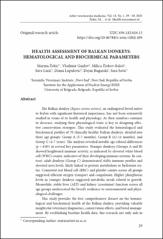Health assessment of balkan donkeys: hematological and biochemical parameters

View/
Date
2025Author
Žekić, Marina
Gajdov, Vladimir
Živkov-Baloš, Milica
Lazić, Sava
Lupulović, Diana
Bugarski, Dejan
Savić, Sara
Metadata
Show full item recordAbstract
The Balkan donkey (Equus asinus asinus), an endangered breed native
to Serbia with significant historical importance, has not been extensively
studied in terms of its health and physiology. As their numbers continue
to decrease, studying their physiological traits is key to designing effective
conservation strategies. This study evaluated the hematological and
biochemical profiles of 70 clinically healthy Balkan donkeys, divided into
three age groups: Group A (5-7 months), Group B (12-14 months), and
Group C (4-7 years). The analysis revealed notable age-related differences
(p < 0.05) in several key parameters. Younger donkeys (Groups A and B)
showed heightened immune activity, as indicated by elevated white blood
cell (WBC) counts, indicative of their developing immune systems. In contrast,
adult donkeys (Group C) demonstrated stable immune profiles and
elevated urea levels, likely linked to protein metabolism or hydration status.
Consistent red blood cell (RBC) and platelet counts across all groups
suggested efficient oxygen transport and coagulation. Higher phosphorus
levels in younger donkeys suggested metabolic needs related to growth.
Meanwhile, stable liver (ALT) and kidney (creatinine) function across all
age groups underscored the breed’s resilience to environmental and physiological
challenges.
This study provides the first comprehensive dataset on the hematological
and biochemical health of the Balkan donkey, providing valuable
insights for veterinary diagnostics, conservation efforts, and breed management.
By establishing baseline health data, this research not only aids inpreserving this endangered breed but also enhances our understanding of
donkey physiology in demanding ecological conditions.
